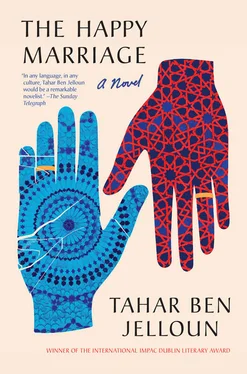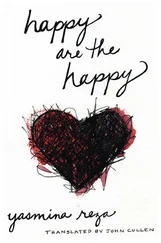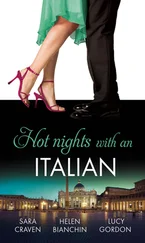One day, the artist had received an invitation to attend a Southern artists’ conference that was to be held in China. He’d dreamed about visiting that country, which he’d known little about, but which fascinated and intrigued him. He’d happily accepted and had begun making preparations for that trip with a youngster’s enthusiasm. It was August. When he’d set foot on the ground at the airport in Beijing, he’d discovered a sky as white as a monochrome painting, but it was a whiteness that seemed a little heavy, a little disquieting. He’d searched for a cloud, or a sliver of blue, but it had been in vain. The Chinese sky was utterly unlike any other on Earth. He felt a migraine brew inside his head. He’d put that down to the air-conditioning and the humidity in the atmosphere, but the headache wouldn’t leave him be, despite all the painkillers he took, which usually worked their effect. Everything seemed strange. He didn’t understand what was happening. He attended a reception at the Moroccan Embassy where he saw a few familiar faces, in particular an old classmate from high school who was now the embassy’s commercial attaché: “Don’t try to look for any landmarks,” he told the painter, “everything here is different. In any case, it’s very difficult to leave embassy circles, everything is closely monitored here!” The painter nevertheless accepted an invitation from the cultural attaché of the French embassy, who knew his work well. He’d taken him to a popular restaurant where the food was prepared by a family. The painter realized that one could eat better Chinese food in Paris than in Beijing. That night, he hadn’t felt well, his head had been spinning, his vision had gone blurry, and his ribs had felt sore. He thought he’d caught a cold. He no longer wanted to be in that country, where everything was secret, rigidly controlled and surveilled. He found it impossible to visit an old Chinese painter whom a Spanish friend had recommended he go see. A simple address clearly wasn’t enough in China. Eventually, the painter had given up on his quest to meet that man. They told him: “Ah, you too want to see him! Everybody wants to see him, but unfortunately, nobody knows where he lives … There are plenty of other painters in this country, not just him, if you like we can arrange for you to visit the best painters in China. They’re great people, and while they’re not known in the West, their talent is indisputable!”
He was feeling ill, but thought that leaving the country would be enough to heal him. After a week, he was able to change his return ticket and arrived in Paris in bad shape. He had a dull pain between his lungs and rib cage that refused to leave him. He went to the pulmonary department at the Hôpital Cochin downtown, where he was given some strong antibiotics. His condition didn’t improve at all. Quite the opposite, he got worse — and he was admitted to the ER as he started choking. He came close to dying, although he hadn’t stared death right in the face, but instead smelled a strong odor that was like a mixture of bleach, ether, and cooking fumes. Death had to go down several hallways to strike its intended target. They’d given him oxygen, and he’d spent several hours in the ER’s waiting room because they hadn’t had any available beds in the department he needed. At night, he’d been transferred to the tropical disease ward where they had a spot for him. A lucky turn of events for him. Purely out of coincidence, a young doctor had asked him: “Have you recently traveled to Asia?” The painter had nodded. All of a sudden, he felt as though the stench of death had withdrawn, and that the shadow of death had flitted away. The young doctor, who had an air of mystery about him, had asked him: “Did you eat any raw shellfish?” The painter had then remembered seeing a shrimp in the salad at the family restaurant where he’d eaten. “You’ve got a parasite that exists only in Asia, which only affects shellfish and attacks the lungs. I think you’ve got pulmonary distomatosis, or paragonimiasis, after the parasite called paragonimus.” The doctor had immediately given him a couple of tablets to swallow. “If you can’t sleep we’ll give you some sedatives and sleeping pills,” he’d said, then he’d disappeared. That night was one of the most terrible in the painter’s life. His mattress was covered in plastic on top of which they’d put some coarse sheets. It gave off an unbearable heat. It tortured him, but they couldn’t change his bed. So he decided to sit up, although he did so extremely carefully to avoid pulling out the oxygen tubes that were allowing him to breathe. He felt as though fire were coursing through his body, that his skin was burning and his hair was falling out. He felt once again that his end was in sight, which allowed him to understand why people said death was the disease, because death in itself was nothing, and what preceded it was far worse. He remembered what his mother used to say whenever she had a bad night: “This will be one of the nights I tell my gravedigger about!” He laughed because as a child he hadn’t understood how a dead person could still speak, especially to the person digging their grave. And what would she have told him anyway? That she slept badly, had suffered from anxiety, cold sweats, that she had a feeling of impending death with its string of sufferings and uncertainties?
Unable to sleep or take his mind off his pain, he’d written down his impressions in the notebook he usually used for his sketches. In the hours between vigil and sleep, it was as though a voice had dictated those words to him:
The night of September 27th and 28th. A searing heat is setting my sore skin on fire, and this is more unbearable than the disease itself. A long ordeal. This night is like a waiting room in a cave where people are tortured. I sweat, I choke, I open the window, I’m afraid of catching a cold. I wait for the morning in front of a plastic-covered sofa that is incredibly ugly. The patients who spend the whole day here stretched out on their beds must be unable to sleep at night. Arrangements should be made to fill their time, activities or games should be organized, entertainers or mimes or clowns should be brought in, just like they do for children .
The infernal bed where I tried to sleep in every position known to man gives off these burning waves that transform into nightmares before my body succumbs to fatigue: our home was ransacked by children who spilled buckets of colors everywhere, on the furniture, the bed, the library. I see someone kneeling while cutting red, yellow, and green sponges. All throughout, the children ignore my presence and splash about in the puddles of colors. Even though I cannot see the face of the kneeling man, I start hitting him so hard that I wake up drenched in sweat. I jump up in bed and almost fall off. I can’t stand my skin touching this evil bed anymore .
I sit on the sofa, which I cover up with my clothes so my skin won’t touch the plastic. I doze off. I dream again. I’m in Casablanca, at the Hotel Riad Salam. I hail a taxi. The driver goes really fast and doesn’t care that I slam against the window every time he takes a turn. He’s in a real hurry, he doesn’t listen to me, doesn’t turn around, he must take me to where I told him I want to be dropped off. The doors are locked. We arrive in Casablanca’s medina and the guy throws me into a courtyard where some young men seem to be waiting for me. The first man who looks at me is bald and doesn’t have any teeth. He stares at me for a long time and I hear: “That’s it, now you’re gonna pay.” Then he leaves me in the hands of the others, who all look aggressive. I don’t recognize anyone in that crowd. A guy in a brown sweater says: “Why don’t you write in Arabic? Now you’re gonna pay!” Then I reply: “But I’m not a writer, I’m a painter, you’re making a mistake.” But nobody believes me. I hear them say: “We know who you are, we’ve seen you on TV, you speak to us in French.” I try to reason with them, to defend the right of those who write in French even though I’m not a writer, but I can feel their hatred. They want to try me and to immediately sentence me to death. I sense that I’m lost. I tell them: “I’ve come to Casa to exhibit my paintings.” They laugh, then they yell: “He wants to run away from us, to pretend he’s a painter so we won’t judge him; that’s easy, because painting is neither French nor Arabic.” … At that moment, a gray-haired man arrived. I felt as though I knew him. He suggests postponing the trial until I have been properly questioned. I escaped being lynched … This man doesn’t speak to me, he turns his back to me and leaves me in a corner where children are arranging a table, chairs, and torture instruments …
Читать дальше












